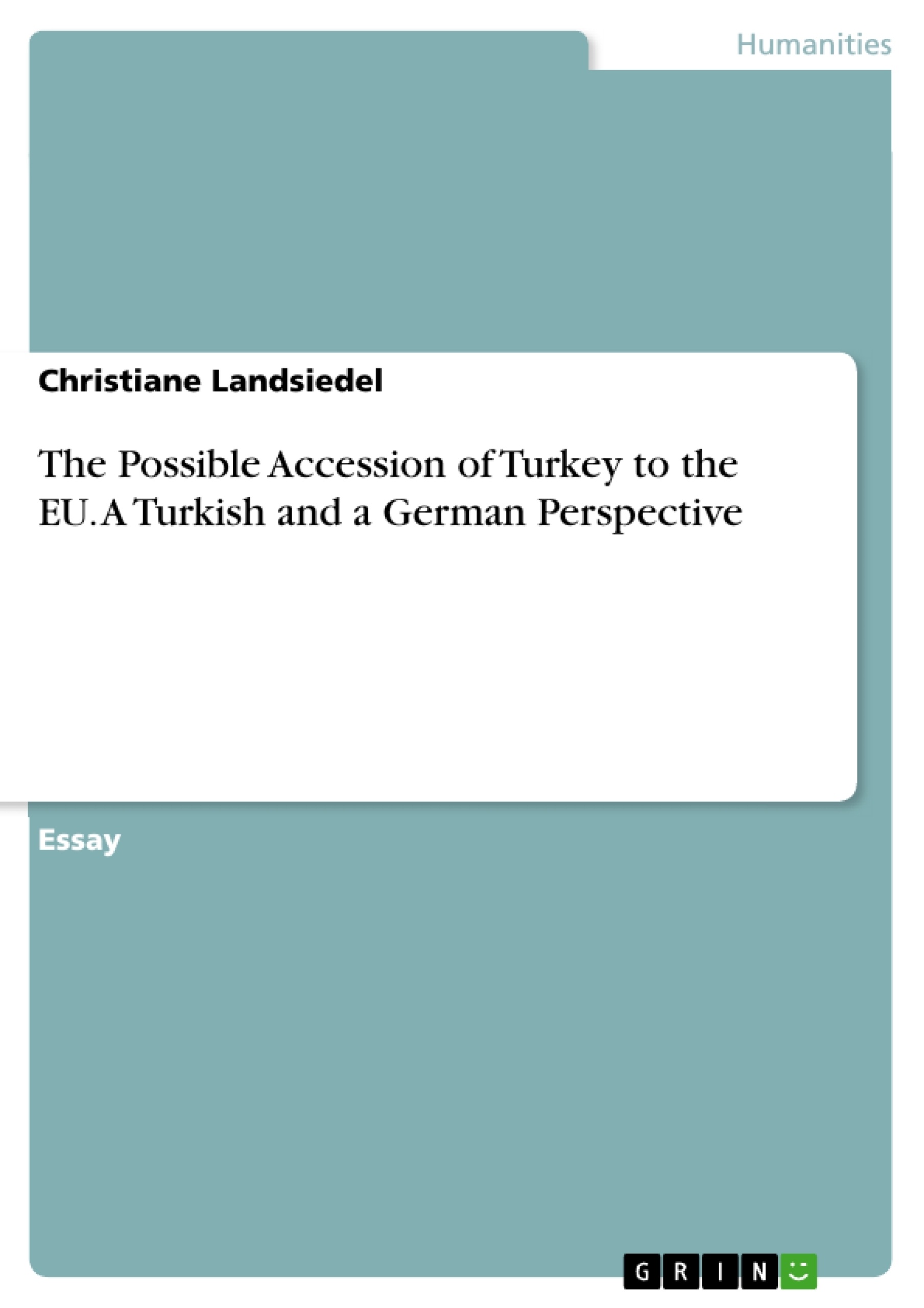Turkey can be characterized by two contrasting images. On the one hand, the country has been a staunch member of NATO for over 50 years. It has a thriving democracy, a lively free press and a stable government with a big parliamentary majority. Although most of its people are deeply religious, Turkey is ferociously secular. Moreover, its economy is booming: during the past two years, the GDP has risen by an annual average of 8.4 percent and inflation has fallen by three-quarters, near to single figures. In contrast to the current EU, this country has a young and growing population. Its biggest city was a cradle of Christian (and European) civilisation. To sum up, with regard to the mentioned facts, Turkey seems to be a promising gain for the European Union.
But also the following aspects depict Turkey: it is situated mostly in Asia and it borders such worrisome countries as Iraq, Syria and Iran. The country’s economy has been a hopeless case for decades, its currency has been repeatedly devalued, many of its banks are ailing and it is one of the largest debtors of the IMF. Turkey is far poorer than eve n the poorest of the ten countries that joined the EU in May 2004. It has a history of military coups and its frightful human-rights record and the torture of prisoners are well documented. Its people, who are for the most part Muslim, could soon form the EU’s biggest population. Briefly, as far as these issues are concerned, Turkey seems to lose any attractiveness to join the Union.
This portrayal of Turkey in such utterly contrasting ways explains why Turkey presents such a critical questio n for the EU. No other country’s presumed membership has arisen such excitement and many several European commissioners have voiced their reservations against the joining of Turkey. In September 2004, a further controversy broke out over a Turkish government proposal to criminalize adultery, which was hastily abandoned after strong protests from Europe. Last year, the Turkish Prime Minister, Recep Tayyip Erdogan, has become a central actor on the European agenda, urging the case for starting membership talks.
Inhaltsverzeichnis (Table of Contents)
- Introduction
- Turkish Perspective
- German Perspective
- Concluding Remarks
- Bibliography
Zielsetzung und Themenschwerpunkte (Objectives and Key Themes)
This essay investigates the potential economic, political, and cultural implications for both Turkey and Germany if Turkey were to join the European Union. The analysis considers Turkey's existing socio-economic conditions, its political reforms in light of the Copenhagen criteria, and its cultural and historical context. It also examines the perspective of Germany, the largest EU net-payer, taking into account the potential economic and political challenges posed by Turkey's accession.
- Turkey's potential benefits and challenges of EU membership
- Economic and political implications of Turkish accession for Germany
- The role of the Copenhagen criteria in assessing Turkey's suitability for EU membership
- Cultural and societal impacts of Turkey's potential integration into the EU
- The historical context and ongoing debates surrounding Turkish membership
Zusammenfassung der Kapitel (Chapter Summaries)
- Introduction: This chapter provides an overview of Turkey's multifaceted image, highlighting both its strengths and weaknesses in relation to potential EU membership. The chapter sets the stage for the following analysis by presenting the contrasting perspectives on Turkey's readiness for EU accession.
- Turkish Perspective: This chapter explores the potential economic, political, and social implications of EU membership for Turkey. It analyzes the country's economic performance, including its reliance on agriculture and the need for structural support, as well as its ongoing reforms in areas such as judicial reform, human rights, and minority rights. The chapter also addresses the implementation challenges and remaining concerns regarding Turkey's readiness to join the EU.
- German Perspective: This chapter examines the potential impacts of Turkish accession on Germany, considering factors such as the economic and political challenges posed by Turkey's size and economic situation. The chapter explores the implications for Germany as the largest EU net-payer, the potential for increased financial transfers, and the potential effects on Eastern Germany. The chapter also discusses the broader context of Germany's relationship with Turkey, including the issue of migration and the integration of Turkey's large diaspora in Germany.
Schlüsselwörter (Keywords)
The main keywords and focus topics of this essay include Turkey, European Union, EU membership, accession, Copenhagen criteria, economic implications, political reforms, cultural impacts, Germany, net-payer, migration, integration, Turkish diaspora, Islam, secularism, human rights, Kurdish minority, Cyprus issue, and the historical context of Turkish-EU relations.
Frequently Asked Questions
What are the main arguments for Turkey joining the EU?
Turkey offers a booming economy, a young and growing population, a stable democracy within NATO, and a strategic bridge between Europe and Asia.
What are the primary concerns regarding Turkey's EU accession?
Primary concerns include its human rights record, geographical location mostly in Asia, economic disparity compared to EU members, and the potential impact of its large Muslim population.
What are the Copenhagen criteria?
They are the essential conditions all candidate countries must meet to join the EU, including stable democracy, the rule of law, human rights, and a functioning market economy.
How does Germany view the potential Turkish accession?
As the largest net-payer, Germany faces economic challenges regarding financial transfers and concerns about the integration of the large Turkish diaspora already living in Germany.
What role does secularism play in Turkey's EU bid?
Turkey is a ferociously secular state despite its religious population, which is seen as a crucial factor for its compatibility with European democratic values.
- Quote paper
- Christiane Landsiedel (Author), 2005, The Possible Accession of Turkey to the EU. A Turkish and a German Perspective, Munich, GRIN Verlag, https://www.grin.com/document/35502



